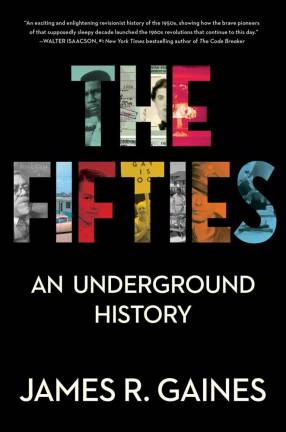A Legendary Editor Takes Us Back ...
Jim Gaines, former top editor at Life, Time and People explores the Fifties

Jim Gaines is truly a legend in the world of print journalism. At various times, he was the top editor at Life, Time and People. In the last several years, he has been writing books and the latest, called “Fifties, An Underground History” intrigued me. Having grown up in that decade, I assumed his tale would take us nostalgically from Pat Boone to Elvis, and all that represented. In fact, he has pretty much ignored the arts: Rather he focuses on the challenging and controversial key movements (feminism, civil rights, ecology) of the ‘60s and then finds individuals — some better known than others —who spearheaded them in the decade before.
“I got the idea for the book when my kids said they wished they’d lived in an exciting time like I did in the ‘60s,” the author told me. “I realized that the previous decade, known for its complacency, must have had something to do with leading into that tumultuous time.”
He has succeeded. The great biographer Walter Isaacson says of Gaines’ book, “Here are the inspiring tales of the unsung heroes who sowed the seeds of the gay rights, civil rights, feminist, and environmental movements. They were the true rebels, and their bravery show us how real social change occurs.”
Gaines himself, in his introduction, writes, “among the isolated people of the 1950s, there is the moment when a singular woman or man sets out to confront rather than evade some intimately personal conflict. Which, in turn, inspires them to change the hearts and minds of those who make the laws.”
Impactful Lives
One of those he profiles is Pauli Murray (also the subject of a 2021 documentary), a black, sexually fluid lawyer who ultimately influenced the work of Ruth Bader Ginsberg. A gay man named Harry Hay had a surprisingly impactful life, though very few – outside that once-hidden community – know his name. “He lifted the burden of shame for millions of people whom the medical professions called psychopaths, the church called wicked, and the state called felons,” Gaines writes.
In perhaps the book’s unlikeliest pairing, we hear the prophetic voices of “The Silent Spring”’s Rachel Carson and MIT’s preeminent mathematician, Norbert Wiener. (Whom the New York World called the brightest boy in the world. He was 12.)
“In temperament and personal history Rachel Carson and Norbert Winer had nothing in common,” Gaines writes, “but who, from their very different perspectives, converged on the then-heretical idea that our mastery over the natural world carried the potential for disaster.”
I could not resist asking this man of magazine legend what he thinks of the current state of journalism. “The way the Internet has replaced print is not a happy story,” he says. “It is creative destruction in a way. Magazines like The Atlantic are still really great, but it’s a model that is collapsing. In the 70s and 80s it didn’t feel like we were doing shlock, or if we did at times, it was redeemed by the good.”
Though he now lives in Santa Fe, this city will always be where Jim Gaines mastered his trade. “My dad was transferred to New York City when I was a sophomore in high school, and except for college and other temporary diversions, I lived there for the next half-century or so. Every time I go back, I think how lucky I am to have lived there.”
Ah, youth. My generation grew up with Sandra Dee, Dick Clark, and Annette Funicello. Then we spent a lot of time protesting, and we had our victories too. But after reading Jim Gaines’ book, I cannot help feeling that people like those he profiles, were the more authentic rebels. In part because they did not think of themselves that way.
Michele Willens’ book, “From Mouseketeers to Menopause: With Marches, Marriage and Motherhood in-Between,” has recently been released on Amazon.